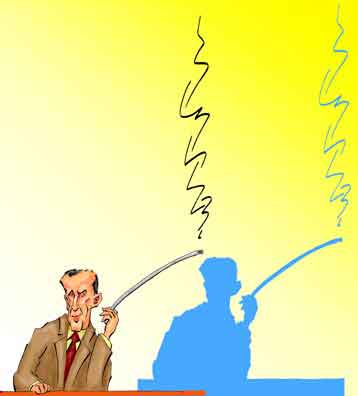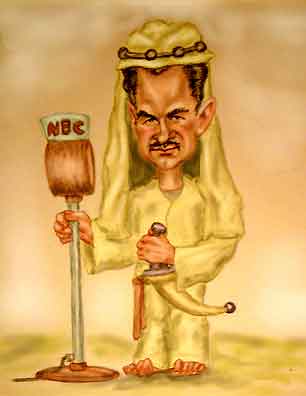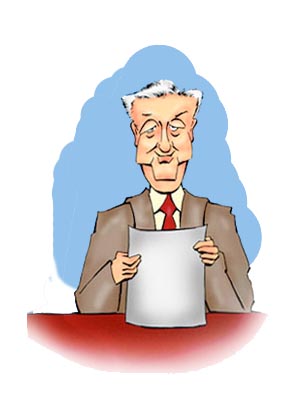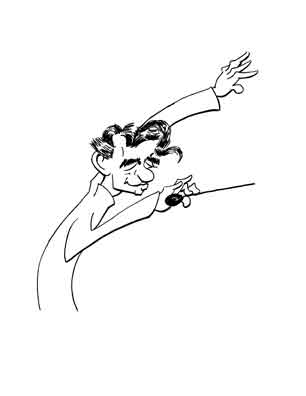Edward R. Murrow
The Next Generation

Edward R. Murrow
née Egbert
At one time Floyd Gibbons was one of the most famous men in the world. Starting in 1930, he broadcast the only daily radio news program on the air. He was a friend of Will Rogers (and Will even mentioned him in his columns) and as late as the 1960's, Floyd was written in as a character on one of The Untouchables television show starring Robert Stack. And that was over three decades after Floyd's final broadcast.
Virtually unknown today, Floyd's tenure as a newscaster was brief. Within a year he had run afoul of his sponsor, the Literary Digest. The differences were not so much due to editorial policy, as to Floyd's modus vivendi. Floyd was a heavy drinker and lived what we could call a swashbuckling lifestyle. The Literary Digest, on the other hand, wanted to avoid non-family oriented announcers, and Willard J. Funk, the president of their parent company (Funk and Wagnall's obviously), was a teetotaler. So the Digest told the head of CBS, William Paley, to find someone else. And as Floyd announced on his last show, William decided to replace him, a newspaperman with a professor
The professor was Lowell Jackson Thomas. And keeping with the ongoing tradition in journalism where the news media might report a hunter bagging a 97 pound duck or cite primary source documents from 1972 weren't written until 2004, Floyd's report was not exactly spot on. Lowell had been an instructor at Chicago's Kent Law School and also at Princeton. Still, like "Captain", the title "Professor" can be used in courtesy. So we can cut Floyd some slack.
But Floyd's major - and deliberate - error was one of omission. He neglected to mention that Lowell himself had been a reporter beginning in 1912, had been the first Allied newsman to enter Germany after World War I, and - for what Lowell is still well remembered - was first to report the story of Lawrence of Arabia. After writing a number of best selling books, Lowell was asked to stop by the CBS studios in New York where he was given a ten-minute audition and hired to replace Floyd. So it's certainly correct to call Lowell one of the true pioneers of radio broadcasting.

Lowell Thomas
A True Pioneer
Of course, after the pioneers come the first native-born generation. And the most famous broadcaster of that era was Egbert Roscoe Murrow. Egbert was born April 25, 1908 on - this is not a joke - Polecat Creek in Greensboro, North Carolina. His folks, though, moved to the northwest when Egbert was five and "Egg", as he was called by family and friends, grew up in the state of Washington.
Egbert's childhood was typical of early twentieth century rural farming people, and lived in if not abject then not genteel poverty either. When not attending school, he worked at odd jobs and in logging camps. But this was the time when getting an education was seen as the way up, and his brothers had enrolled in Washington State College at Pullman. So Edward - a name he began to prefer - followed suit.
It is quite impressive to read how people who lived in poor families managed to not only attend, but excel at college. Not to detract from such accomplishments, but we should also remember that this was the time before college tuition reached parity with upper level annual incomes for a family of four where both spouses work. In fact, tuition in many colleges - even private institutions - was the smallest part of the actual cost of attendance.
At Pullman, Ed started out in business administration but switched to speech. As sometimes happens, so-so students in secondary school sometimes become good performers in college particularly with the right professor. Soon Ed was the star pupil of Professor Ida Lou Anderson.
At WSC, Ed became not only one of the the best speech students, but one of the best students. He acted in plays, became a skilled debater, and even played basketball. He was elected the student president of WSC and then as the president of the Pacific Student Presidents Association.
But there was bad news with the good. When Ed graduated in 1930 the Great Depression had really smacked the country. But as the president of PSPA, he was offered a job to be the head of the National Student Federation of America (NSFA). Ed's pay - $25 a week - has been described as "paltry" but it was actually pretty fair for the time. The job as Ed described it was "arranging cheap student tours to Europe, visits to America of Oxford and Cambridge debating teams, etc."
Actually there was more to the "etc." than Ed let on. With the help of Fred Willis, of one of the higher level executives at the then new Columbia Broadcasting System, Ed began hosting a weekly half-hour radio program, University of the Air. Although it's hard to tell who came up with the idea - whether Ed or CBS - the show featured famous people giving their views on the topics of the day. One of Ed's guests was Albert Einstein.
Ed also did something that was either brilliant or reckless depending on your point of view. There was a national meeting of the NSFA scheduled for Atlanta. Knowing full well that there could be trouble, Ed managed to get Howard University and other black colleges to send delegates to the conference.
Naturally there was opposition even among the students. But Ed was somehow able to convince everyone that they had intended to have a policy of integration all along. Then finally - a real coup - Ed was able to finagle a closing banquet at the fancy Biltmore Hotel in Atlanta which the black students also attended. It did require a bit of subterfuge since the staff were not permitted not serve black people. The servers got around that technicality by simply handing the plates to the white students who then passed them on to their black neighbors.
Ed's work at NSFA came to the attention of the president of the Institute of International Education, Dr. Stephen Duggan. Ed's new boss (and soon to be good friend) brought Ed into contact with many of the high and mighty on the East Coast including Franklin Roosevelt, who was now beginning his rumblings toward the Presidency.
Ed's job took him more and more abroad, and he helped start a number of cooperative educational projects for students in America and in Europe. But these trips were no boondoggles. On one voyage Ed and his new wife, Janet, agreed to help defray costs by serving as social directors on board the ship.
Things didn't always work out exactly as planned, of course. One of Ed's projects was to try and arrange summer courses for American students in Moscow. Although technically successful, the Russian authorities took over the program, and later this episode came back to cause Ed a bit of trouble.
The job at IIE was OK, but it wasn't really something Ed wanted for a life career. So he applied to Rockford College (now Rockford University) in Illinois - not for the position of of a graduate student, an instructor, or professor - but as the college president.
Now it is true that in the 1930's academic jobs did not necessarily require the multi-degrees and post-graduate experience they often do now. Some full professors at major universities - and we're talking Harvard and Oxiford - had no higher degrees than a bachelor's.
But would a 24 year old with a BA in speech land a job as a college president? Not, as Eliza Doolittle said, bloody likely.
Still Ed was offered the job - and as quickly had the offer rescinded.
And the reason?
Weeeeeelllllll, it seems that the administrators at Rockford found that Ed had puffed up his credentials. Ergo, he lied. Alas, this wasn't the first, nor the last time Ed stretched things. We do know he elevated his age at IIE by two years, and although, we don't know the exact puffing he did at Rockford, in a later job application he claimed to be in his mid-30's and to have a master's degree in political science and international relations from Stanford. Or at least that's what the 27 year-old BA in Speech from Washington State put on his job application at CBS.
Now today one of the most popular news stories is when some grubby politician or fat cat businessman is found out that he claimed he went to Oxford or Harvard when he really dropped out at Sunningdale Technical School at Bournemouth. Interestingly, such puffing is more common for the executive jobs than at the entry level positions, mainly because few people actually bother to check. But when it does happen, the miscreant usually had to abandon his public career and end up taking a job in a business run by one of their buddies.
This didn't happen to Ed because this was one time that no one bothered to check on the entry level candidate. What's odd is that almost certainly Ed would have gotten the job anyway based on his credentials. After all he did major in speech at an accredited University and he had experience in radio from his days at NSFA. He had consistently shown strong organizational skills and was able to get things done. It also helped that Fred Willis, whom he knew from his University of the Air broadcasts, put in a good word for him. You can't beat good contacts whatever your background.
Nor can you beat also making a good first impression. Ed's interview was with the #2 man at CBS, Ed Klauber. And Ed K. (to distinguish him from Ed M.) was a man you needed to make a good impression on. He was in fact one of the most fractious, blustering, and downright terrifying bosses anyone could have. Everyone at CBS hated him except William Paley, the big boss at CBS. But somehow Ed M. found Ed K. congenial, and Ed K. was impressed with his younger namesake - and possibly his forged credentials. But whatever the reasons, Ed K. hired Ed. M.
Even today, some of Ed's detractors - and he does have them - go into spittle-flinging diatribes as to why should we admire a phony and a fraud like Ed - who is liberal - when we trash phonies and frauds like Jeremy Archer - who is conservative. Of course, ignoring the fact that Ed never went to prison for perjury, Ed was fortunate to live before the era of gotcha journalism, as was John Kennedy, Franklin Roosevelt, Abraham Lincoln, and George Washington and other well-respected public figures. And we should point out, though, that Ed did rather sheepishly 'fess up to another of the CBS executives. But by then Ed had shown what he could do.
Ed's first job at CBS had the long winded title Director of Talks to Coordinate Broadcasts on Current Issues. It was not an on-the-air job - which was OK with Ed - but was (as the name suggests) a director to coordinate broadcasts on current issues. At first Ed had some difficulties with some of his fellow employees with turf battles and such, but all in all Ed did well.
Then Cesar Saerchinger, who was the European Director for CBS, returned to America. Ed's bosses (mainly Ed Kluber) thought he should take the job. But Ed himself was a bit dubious. Still with a bit of arm-twisting from his friends and colleagues - and perhaps from his enemies - in 1937 Ed and Janet sailed for London.
At first the job was rather restricted. He and William Shirer, who was in Germany, were supposed to coordinate the broadcasts about cultural issues. But Germany was arming up for war, for crying out loud! And Ed and William were supposed to talk about embroidery on lederhosen?
Well, everything took care of itself with the Anschluss of Austria in 1938. Ed made his first broadcasts on the topic from Vienna. His voice, delivery, and style met approval of the CBS bosses in New York. Ed was suddenly the chief broadcaster from Europe.
William Shirer, who later wrote the first definitive history of Nazi Germany, The Rise and Fall of the Third Reich, was one of the first of the "Murrow Boys" as they were called. These were the roving correspondents who would broadcast their stories in coordination with Ed. Other of the "boys" were Thomas Grandin, Larry Lasueru, Cecil Brown, Winston Burdett, William Downs, and Richard Hottelet. Most went on to successful journalism careers and others, like Charles Collingwood, Eric Sevareid, and Howard K. Smith, became even more famous to later television audiences than Ed.
There was also Marvin Breckinridge, who has the one distinction of not only being one of the "Murrow Boys" and also being a lady. Marvin's full name was Mary Marvin Breckinridge, and she did not use her middle name just to blend in with the fellas. The actual reason was there was another Mary Breckinridge in the public eye and to avoid confusion Mary used Marvin.
It's now forgotten but there were originally a number of women correspondents in Europe. And in what seems incredibly chauvinistic and ridiculous today, CBS soon decided the woman's place was not in a theater of war. Two of the women reporters, Betty Watson and Helen Kirkpatrick, were actually told to find men to replace them while, absurdly, the head of the CBS offices in New York insisted all their secretaries be men. Eventually Mary Marvin, finding the all male environment uncongenial, left.
Then of course came Munich which today people deride as shameless appeasement. However, at the time the agreement with Hitler and British Prime Minister Neville Chamberlain was received with relief. Most people - including a lot in the United States - were hoping that Germany would be satisfied as long as they had Austria and Czechoslovakia. But Poland, Neville warned Adolf, was a no-no. So when German troops did cross their eastern border, England declared war.
England, yes, but as Brits point out gleefully, America always seems quick to jump into wars they shouldn't be in and are ready to stay out of wars when they should join mit gern. For two years - from September 1939 until December 1941 - England was at war with Germany, but America was not. So American correspondents could stay in Germany and the occupied countries - i. e., virtually all of Europe - and report on the war from the other side.
Naturally if you are covering a regime led by xenophobic, murderous nutballs you will have problems. The reporters were harassed, their broadcasts censored, notebooks seized, and at least one - Howard K. Smith - was arrested by the Gestapo. Happily Howard was soon released and managed to get across the border to Switzerland the day before Pearl Harbor. So he and his Danish wife were (relatively) safe when Germany declared war on the United States four days later.
Ed was soon one of the most famous men in America and his sign-on "This ... is London" became iconic. We certainly talk about Ed's fame, but his most enduring legacy is that his delivery has been copied by nearly every on-the-spot correspondent in the world. You'll hear echoes of Ed whenever you flip on the tube: "Joe Blow ... Bumfurble News ... Rattan, Oklahoma."
As famous as Ed's London broadcasts were, some of his postwar stories were as notable. He broadcast the story of the liberation of Buchenwald, a camp which had been the subject of a Life Magazine article in 1939. The reality of Buchenwald in 1945 was far worse than were the surprisingly grim German propaganda photos which had accompanied the Life article, an article to which a letter to the editor (from an American) had thought might have been exaggerated.
After the war, Ed started his television show See It Now which was about topical news of the day. One of his most famous broadcast has to be his story about a US Air Force pilot, Milo Radulovich, who had been dismissed from the service for his - quote - "close and continuing association with communists". One of the "communists" were Milo's sister - who was liberal not communist, but in any case stated any of her views were hers alone. The other - and please note the quotes - "communist" was Milo's father - who was not only not a communist but who simply been flagged by the government for subscribing to a magazine in Rumanian, his native language. Because of Ed's broadcast, Milo was reinstated.
And of course, Ed got into his famous tiff with Non-Tailgunner Joe McCarthy. His shows were critical of Joe's tactics in supposedly rooting out communists. Now actually Ed was not a fan of Russia, but he thought that Joe's sweep of the Enemies of America was netting honest patriotic citizens. Although Joe's popularity was waning, Ed's broadcasts helped end Joe's influence. Although the shows may not really have had a cause-and-effect as sometimes thought, Joe was soon censured by the then quite conservative US Senate.

Howard K. Smith
Not a Traveler
Not surprisingly, there have been attempts to rehabilitate Joe's reputation in recent years. Gleefully, Joe's defenders point to the fact that now many people believe Alger Hiss, the state department employee who was tried and convicted of perjury, really was a Soviet Agent. So they say, Joe really was justified in his attack on communism.
We have to admit this is not only a strange line of reasoning but also a logical fallacy. Even if Alger was divulging state department info to the Russians, that doesn't mean that people such as Burgess Meredith (the Penguin on TV's Batman, Leonard Bernstein (conductor of the New York Philharmonic, Danny Kaye (the famous comedian), Ruth Gordon (famous to later generations for Harold and Maude), Howard K. Smith (one of Ed's "Murrow Boys"), Orson Wells (famous director and star of Citizen Kane, Ossie Davis (very famous for many roles, including Bubba-Ho-Tep, Rube Dee (again very famous for her movies), Eddie Albert (star with Eva Gabor on Green Acres, Edward G. Robinson (well-known for his gangster roles and his art connoisseurship), Orson Bean (a largely comedic actor but most famous as a panelist on To Tell the Truth, Harry Belafonte (famous singer of calypso songs and Civil Rights activist), or Gypsy Rose Lee (no comment) were commies. And of course after Ed's broadcasts, Joe added another name to the fellow travelers who were soft on communism and who once helped set up an educational program with Moscow: Ed Murrow.

Leonard Bernstein
Ditto
Of course, Ed also broadcast what were human interest stories. One of his nicest shows was when he interviewed both Louis Armstrong and the artist Anna "Grandma" Moses. Louis, of course, was used to performing, but Grandma also answered Ed's question with aplomb.
"Where do you think you'll be in twenty years, Grandma?" Ed asked.
Grandma made a slight gesture.
"Up there," she replied.
At the time Grandma was 94. She died in 1961, aged 101.
Why Ed's show ended is subject to interpretation. Differences of opinion with William Paley, perhaps; the general dumbing down of television shows, possibly; difficulty with finding good sponsors (not mutually exclusive with the first two reasons). In any case See It Now ended.
Ed kept on with radio and television, but nothing was as successful as his earlier broadcasts. He even found himself being relegated to a secondary role for Walter Cronkite during the 1952 Presidential election - as was Lowell Thomas. Ed at least got to sit at a desk and give the first prediction that Eisenhower was going to win the election hands down (and thus beating out Charles Collingwood who was reporting on the predictions using the UNIVAC computer). Lowell, who was still doing his daily radio broadcasts, was a roving reporter.
Then in 1961 Ed left the network industry to become the director of the United States Information Agency, a government department which among other things ran the Voice of America. Today, of course, international communications, foreign television shows, and print stories are a mouse click away. But until the 1990's, access to foreign media was difficult or impossible.
Ed was also appointed to the National Security Council, showing that neither John Kennedy (nor later Lyndon Johnson) gave much truck to Joe McCarthy's criticism of Ed's political associations. But it was a rather strange appointment for someone who was known for open and hard hitting questioning of politicians. We do wonder, though, if perhaps this was a calculated move by the government to make sure Ed would not report on things they didn't want reported - similar to the Nixon administrations ploy when they tried to hire Mike Wallace - later a founder of 60 Minutes - as White House press secretary. In any case, Ed stayed at the USIA and NSC until 1964.
Ed had been a very heavy smoker, taking in about three packs of (unfiltered) Camels a day. It's no coincidence that the year before he had resigned from the USIA and NSC, he was diagnosed with lung cancer. He died two years later, age 57.
References
Prime Time: The Life of Edward R. Murrow, Alexander Kendrick, Little, Brown, 1969. The first biography which appeared four years after Ed's death.
The Life and Work of Edward R. Murrow, The Murrow Center, Edwin Ginn Library, Tufts University. At one time (and maybe now) there was an on-line website for this exhibit.
Edward R. Murrow and the Birth of Broadcast Journalism, Bob Edwards, Wiley, 2004. Some criticism has been leveled at the book for some errors, but it's a good place to get a quick overview of Ed's life.
Edward R. Murrow: His Life, Legacy, and Ethical Influence, Howard Rose, MA Thesis, University of Nebraska, 2010.
A Complex Fate: William Shirer and the American Century, Ken Cuthbertson, McGill-Queen's University Press, 2015. Contains information about Ed, of course. Ed and William would sometimes coordinate their broadcasts, Ed from London, William from Germany.
"Two American Originals", See It Now, Edward R. Morrow (moderator), Louis Armstrong, Anna Moses, CBS, (1955).
Political Commentators in the United States in the 20th Century: A Bio-Critical Sourcebook, Chevelle Newsome, Greenwood, 1997. Strange pricing on this book. You can spend a few bucks for a used hard copy but over a hundred for the electronic version.